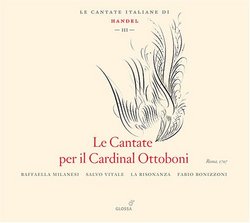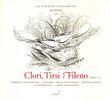| All Artists: George Frederick Handel, Fabio Bonizzoni, La Risonanza, Raffaella Milanesi Title: Handel: Le Cantate per il Cardinal Ottoboni Members Wishing: 1 Total Copies: 0 Label: Glossa Original Release Date: 1/1/2008 Re-Release Date: 2/26/2008 Album Type: Import Genres: Pop, Classical Styles: Vocal Pop, Opera & Classical Vocal, Chamber Music, Historical Periods, Baroque (c.1600-1750), Classical (c.1770-1830) Number of Discs: 1 SwapaCD Credits: 1 UPC: 675754005634 |
Search - George Frederick Handel, Fabio Bonizzoni, La Risonanza :: Handel: Le Cantate per il Cardinal Ottoboni
 | George Frederick Handel, Fabio Bonizzoni, La Risonanza Handel: Le Cantate per il Cardinal Ottoboni Genres: Pop, Classical
|
Larger Image |
CD DetailsSimilar CDs |
CD ReviewsHandel's quest for perfection Mike Birman | Brooklyn, New York USA | 03/11/2008 (5 out of 5 stars) "In Rome now for nearly a year, that warm Summer of 1707 featured a 22 year old Handel at ease with Italian musical forms. The young Saxon composer sublimated the northern musical idioms upon which he'd been nurtured, and erupted in an exceptional and seemingly unending flow of Italianate melodic beauty. Unequalled in their perfection, Handel's 100 or so Italian cantatas, a third of which feature instrumental accompaniment, have been largely locked away until now. Composed for the private edification of music loving aristocrats, of whom Cardinal Ottoboni, in whose service Handel is believed to have composed the cantatas featured on this release, was probably the most famous: renowned as patron of the arts, and for his illustrious connections (his grandfather's brother became Pope Alexander VIII in 1689). In church music, for the noteworthy double choir masses, payroll records indicate that Ottoboni employed an orchestra of twenty singers and fifty instrumentalists. His splendid orchestra featured none other than Arcangelo Corelli as first violinist. One day, when Corelli was unable to perform a difficult French overture, an impatient and enraged Handel grabbed his violin and showed him how to play the piece. Corelli's response is unknown. This superb series from Glossa, of which this release is the third and most recent, will present the instrumentally enhanced cantatas. It is not too early to call this series one of the most significant in recent memory. Here are the fruits of the young Handel's genius, brilliantly performed and lovingly presented. Since most of these cantatas are largely unknown, we hear them with fresh ears. Those amongst us who are familiar with Handel only through his later, much grander English oratorios, with their extroverted musical vocabulary, will be stunned by the sheer delicate beauty of these Italian cantatas. Handel seems to have thoroughly absorbed the expressive musical essence of southern composers such as Monteverdi, Corelli and Scarlatti. Baroque guitars and soft, plaintive oboes accompany Raffaella Milanesi's lovely soprano as she sings of love's cruel torments and the trembling stars shining coldly above sad, lamenting shepherds. The freshness of this music fills a void in our musical souls. Bach's profound cantatas answer to our questing natures, our eternal search for divinity. Handel as a young man appears to yearn for beauty, and for an ephemeral perfection in love that remains forever just out of our reach. These cantatas represent his voyage of discovery and they are achingly, sublimely beautiful. La Risonanza play masterfully as directed by Fabio Bonizzoni from Ton Koopman's Harpsichord. This is as perfect a disc as one could hope to find. Handel at the age of only 22, laboring in Rome that ancient Summer of 1707, when these cantatas are believed to have been composed, had already forged a host of singular ornaments in his splendid career. If the Siren call of Baroque beauty entices you, pounce upon this disc and its brethren as this superb series unfolds. Most strongly recommended. Mike Birman" Handel's Italian Calling Card M. C. Passarella | Lawrenceville, GA | 12/04/2008 (5 out of 5 stars) "Since the subject of Cardinal Ottoboni and Handel's relationship to him is well covered elsewhere on this page, I'll stick to a discussion of the music and its presentation. The cantatas and other vocal music that Handel produced during his sojourn in Italy certainly fulfilled commissions and were dispatched in the highly professional manner that the nobility would have expected of an up-and-coming young composer, but I can't help thinking that the special brilliancy Handel lavished on them was his way of announcing himself to the music world at large, since Italy was at the very center of that world in the early 1700s. The results are so breathtaking that I have a suspicion Handel also set out with all confidence to beat the Italians at their own game. And he did. Probably only the solo cantatas of Vivaldi are in the same league.
Another side benefit that is typically Handelian: the cantatas furnished a grand thematic recycling bin, which the composer tapped for years afterward. The cantatas on the present disc, for example, furnished material for Agrippina and Giulio Cesare, among other works. Of the four presented here, the one cantata for bass, "Spande encore," is brief and intimate. Even more intimate, though, is "No se emendara jamas," which is unusually scored for guitar and basso continuo alone. It has the further distinction of being in Spanish, a decided rarity. It is beautifully tender, as the subtle scoring would lead one to expect. The final cantata, "Ah! crudel," is altogether more brilliant. It starts with a wonderful sonata or sinfonia featuring the two oboes prominently. The first aria--with the soprano complaining bitterly of love's vicissitudes--features a wildly discordant modulation worthy of Gesualdo, In the final aria, "Per trofei," soprano and oboe play tag in a superb display of vocal and instrumental gymnastics. For sheer beauty and virtuosity, Handel never surpassed this music. A perfect foil is the remaining cantata, also scored for oboes, strings, and BC. "Ero e Leandro" describes the grief of Hero as she laments the death of her legendary lover Leander. Subdued and tragic, it lets the soprano demonstrate her command of another set of emotions entirely. Small wonder singers love Handel. Clearly the singers on this disc love Handel and respond to his every demand. Raffaella Milanese's light soprano is especially supple and fluid in "Ah! crudel." Fabio Bonizzoni and his players provide sensitive and, where needed, brilliant accompaniments. This is both an important and a highly entertaining musical offering. " |

 Track Listings (19) - Disc #1
Track Listings (19) - Disc #1


